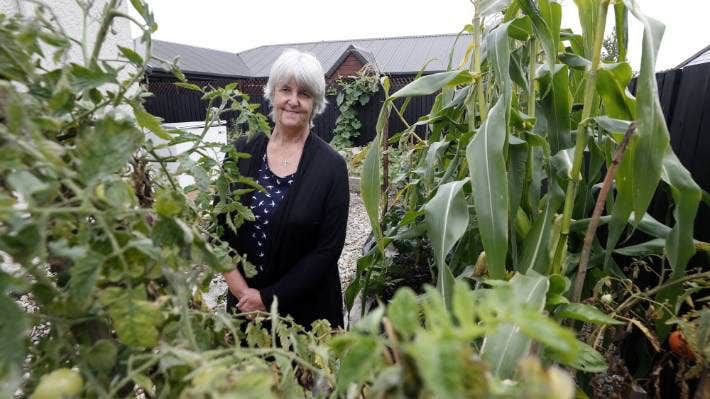Wāhine finding connection and growing roots through kai cultivation
- 26 March 2022
See original article, via stuff

PHOTO: MARTIN DE RUYTER/STUFF
Robyn Parkes in the vegetable garden at Te Korowai Trust in Stoke. The Trust has started Māra Kai, helping teach whanau the basics of gardening and how to provide for themselves.
Every morning, Ginny* heads outside and into her backyard for an hour, where she “hacks, turns soil, and weeds”. It has, she says, given her a reason to get up and start the day.
Only two months ago, the 45-year-old mother of three was feeling quite depressed.
“I hid from the world and slept a lot. Then one day I woke up; it was beautiful outside, but I had no energy. And the kids needed my attention. I realised I needed to get back on track.”
Ginny ‘jumped on Dr Google’ and her online search led her to the Ngāi Tahu website, where she read about Whānau Ora Navigators and how they could help.
As a result, she found her way back to Te Korowai Trust, which had provided her with support more than a decade ago when her children were babies. Today, as one of five wāhine who is part of the Trust’s new Māra Kai project, she is learning how to cultivate a garden and grow her own kai.
“I like the idea of knowing what to plant,” she says. “It keeps me busy. And you can see what you have achieved in only a short space of time.
“The biggest thing for me, though, is that it’s really given me a reason to get up and leave the house. Meeting new people is definitely a bonus.” Ginny pauses. “Actually, I don’t know which one is the bonus. It’s hard to separate the two. In the end, I’m going to have some quite neat new friendships.”
Māra Kai has both informed and inspired her. After only three sessions, Ginny has taken home what she’s learned and transformed a section of her backyard, near the children’s trampoline. Fenced off with chicken wire, it used to be overgrown with waist-high weeds.
“It was really just overgrown lawn and the soil was really hard. I wasn’t sure what to do with it,” she says. For an hour each day, she’s slowly hacked away at the larger plants, turned the soil over, and weeded. Now there are three large garden beds ready for planting.
She laughs. “I still don’t know what I’m doing. But I’m learning so much about how to harvest and what you can do with it. I’m looking forward to learning how to preserve.
“Boil or roast has always been the go to, but there are so many other ways to prepare food, like bottling, freezing or making sauces and soup. They are skills I’m learning, to help myself. It’s pretty empowering.”
Ginny says she’s already noticed the positive changes it’s making in her family. Her three tamariki – who are 15, 12 and 10 years old – are getting involved in different ways. She’s just spent the weekend baking with her 10-year-old daughter.
How the Māra Kai idea took seed
A Network Tasman Trust donation at the end of last year has helped Te Korowai Trust deliver the Māra Kai initiative; teaching whānau how to prepare the soil for planting, grow seedlings, weed the garden, harvest fruit vegetables and store and prepare food.
Te Korowai Trust initially secured funding from ‘Food Secure Communities’ to rip out the landscaped garden and build raised garden beds at Te Korowai Trust’s premises in Main Road Stoke.
“We were then fortunate in gaining funding from Te Putahitanga o Te Waipounamu to further develop the project,” said Robyn Parkes, manager of Te Korowai Trust, which supports whānau from Atawhai to Hope.
“Network Tasman Trust’s unexpected donation was a godsend in enabling the Trust to include aspects that otherwise would not have been possible,” said Robyn. “It was wonderful to get this sort of financial support without having to jump through hoops.”
Parkes said the funding was essential to support whānau in the Nelson/Tasman region.
“With the cost of living so unbalanced with incomes, whanau are struggling to make ends meet,” said Parkes. ‘The kai bill is always the neccesity that gets hit hard. Sadly, this impacts on the ability of whānau to provide healthy kai choices.
“Māra Kai was born out of a need that we saw, which is even more important with food prices being what they are at the moment,’ she said. ‘What we have seen, now that the wāhine are involved, is that the project is evolving and morphing, and taking a new direction each week.’
Wāhine are learning about shopping in season, freezing surplus fruit and vegetables, pest control and composting. Like Ginny, they’re building their own gardens at home and planning to make house visits to each other’s whare. They’re learning about maramataka (the Māori lunar calendar) and how to plan according to the phases of the moon.
Part of the Network Tasman Trust donation was used to equip each whānau with their own gardening kit, including gloves, shovel, garden fork and a flexible bin, which they bring with them each week to fill with the vegetables they have nurtured and harvested.
The remainder of the donation will be used to purchase items such as wheelbarrows, hoses and other tools for wāhine to use at home, as they continue to build their own gardens and grow their own produce.
Unanticipated āwhina (benefits)
Leza Barnes, Te Korowai Trust’s Whānau Ora navigator, said that while the original goal was to improve kai sustainability, overcoming social isolation has become an equally important outcome of the project. Many of the wāhine were looking for opportunities to connect with others and build relationships.
“In the beginning, they had little interest and knowledge in gardening but came along because they wanted to meet people. As a result of the recent Covid restrictions, some of the wāhine have attended with their tamariki.
“The tamariki enjoyed getting their hands in the dirt and their involvement has sparked their interest, so they now help with their gardens at home. The funding will enable us to equip the tamariki with resources too.’
The project has also extended well beyond the garden bed. The wāhine are bringing their own talents and skills to share, leading and teaching karakia one line at a time. There have also been group excursions to pick-your-own growers, with the women arranging to carpool to get there.
“Recently we went to 185 in Hope to pick your own tomatoes and do a price comparison exercise,” said Barnes. “This resulted in bulk buying and sharing produce amongst the group. When heading back, one of the ladies chose to stop at Ewing Poultry and buy a tray of eggs for each whānau to take home.
“It’s humbling watching this kind of interaction and a privilege to be part of. It’s really changing their mindset and it’s wonderful to watch relationships being built.”
Barnes said one of the best things about the project is that there’s little structure, lots of laughs and the women are asking questions.
As well as helping wāhine to feed their whānau, Māra Kai gives them something priceless: “The woes of the world are forgotten for the two or three hours they’re here,” said Barnes.
Focus on future-proofing
In coming weeks, the wāhine will roll up their sleeves and learn how to preserve and make sauces in bulk, in the fully-equipped on-site kitchen at Te Korowai Trust’s premises.
“It’s about learning how to prepare and store food they can turn to in a lean week,” said Parkes.
Given all five whānau only had small freezers on top of their fridges – in which you can only store a couple of loaves of bread – Te Korowai Trust has bought them small, cube-shaped chest freezers.
Te Korowai Trust will also buy a set of preserving pans and are currently collecting glass jars, with a trip to the Recycle Centre planned.
Once they’ve finished the programme, the current group could take the lead in teaching the next group of wāhine to sign up for Māra Kai. There is already a waiting list.
* Ginny requested that we do not use in her full name, in order to protect her privacy.
Kerry Sunderland is a freelance writer and editor, and Pukapuka Talks Programme Manager at the Nelson Arts Festival. As well as the Nelson Mail/Stuff, her work has been published in North & South and on The Spinoff. This article was produced with the support of Network Tasman Trust.
